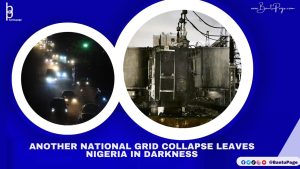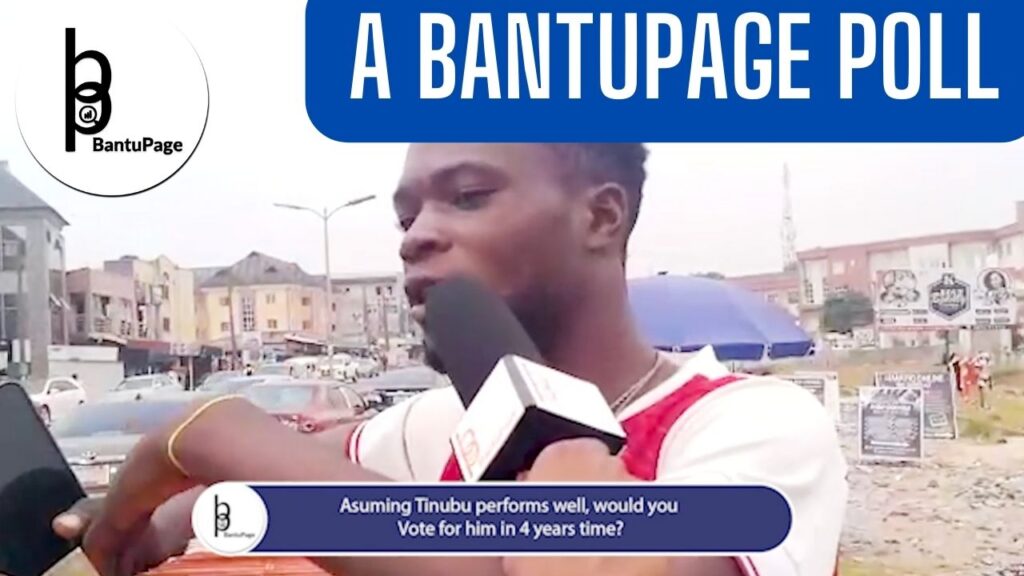
Introduction:
There are more languages spoken in Nigeria than all of Europe, and among these are ethnic identities distinguishing heritage, customs, cultures, and traditions. In this article, we will look at how these identities impact voting habits, associations, and Nigeria’s concomitant status as a country of nations. Our polling question was conscientiously mitigated to invoke and eliminate loopholes from the respondents regarding ethnic voting alignment. There is nothing wrong with identifying by your ethnicity; in fact, you should identify by your ethnicity; it is your identifier, but when that identity coincides with making equitable judgements, it becomes biassed and thus detrimental.
The Southeast and Southwest geopolitical zones are the two most homogeneous zones in Nigeria, i.e., over 95% of the population speaks Igbo and Yoruba, respectively. They identify as Igbo and Yoruba, respectively. The heterogenous concoction found in the other geopolitical zones is not a reality in these zones; they enjoy the homogenic cohesion that comes with propinquity.
Our Methodology:
At BantuPage, we believe in face-to-face polling; the makeup of Nigeria is not one where phone polling can reflect the intended outcome. Our country is bedevilled with endless drawbacks that impede on its functionality; meeting respondents at their place of work, business, homes, or other gatherings yields the closest reflective outcome.
Within communities in a LGA (Local Government Area), we spread our numbers by ten per community and by 5 km2, giving us leverage to broaden the scope of our reach by arithmetically squaring the equation. We use age and gender to delineate patterns. Our variable format is based on the generational grouping of GenZ, Millennials, GenX, and Baby Boomers as separate entities; this gives an insight into the different age brackets.
We also use the typical 100% format to evaluate gross reach in terms of maximal appropriation on a low to high scale. There is an overall, simplified, or extended version and a dissection of the layers within the categories of the subject, e.g., broken down by state, LGA, male, female, age, etc.
Polling Question: Would you vote for a competent non-indigene?
The competent in the sentence is the defining adjective; it rules out outliers and forces the respondent to reach a conclusion outside of ethnic inclination. It is hard to find any Nigerian who will not agree with the statement ‘a working and prosperous Nigeria is what we all want. Therefore, ignoring the competent in that sentence is tantamount to having an agenda beyond what is normal.
Ethnocentrism (tribalism): The belief in the superiority of one’s ethnicity over others; this can also mean the disregard of another ethnicity. Ethnocentrism is a sister to racism; both are bad; they undermine humanity, competence, and the ability of other humans who are not like you. This should not be allowed to flourish; it should be fought with every weapon we have as humans. It was no surprise that some of our respondents displayed ethnocentric characteristics. Some will boldly refuse to entertain the option of voting for a competent non-indigene for the simple fact that they are not of their ethnicity.
When the respondent replies with a yes, we have a follow-up question. In the Southwest, we asked, What if the competent non-indigene was Igbo or Fulani? You’d see how the respondent’s position wobbles with a few mutters like ‘hmms’ and ‘uhms’ followed by a yes at about 65% of the time, 20% with an emphatic yes, and 15% with a mixture of emphatic and hesitant no. The question begs: if we do vote for a competent non-indigene, as the poll claimed, why are our votes still aligning within ethnic lines?
The Poll:
Southeast

The reaction amongst GenZ was disappointing; most GenZ were not born during Nigeria’s civil war. One would think that with the permeation of social media and the live-free lifestyle common with the Woke generation, the GenZ would be less impacted by ethnocentrism. It was the Millennials that topped the list; they were the least ethnocentric. Still, the long ethnic divide is waning among the under-40s, an encouragement to take home. The average age in Nigeria is 18, which can be translated to over 100 million Nigerians belonging to the Gen Z category. It is important to remind ourselves that this poll was only conducted in the Southeast and Southwest. The North has always been different from the South; until a similar poll is conducted in the North, we cannot draw similarities. Is posterity going to live in a different Nigeria, or will another devil surface to replace ethnocentrism? The influx of social media has birthed access to information across the globe in ways that were never foreseen by the Baby Boomer generation. The world is very small; gone are the days where top-class information was a prerogative of the upper class. This diversification of information has brought with it positive and negative aspects.
In the southeast, only 64% of Gen Z said yes to the question. Are young people in the Southeast less ethnocentric? Are they the future of a less tribal Nigeria? You can build up a page of questions for these great numbers coming from the Southeast. The future is bright in the Southeast; it is looking like Nigeria, run by Southeast Gen Z, will be one to envy. 36% of Gen Z said no to the question, which is lower but still reasonable to be worried about. What is it that can make one refuse to elect a competent non-indigene? How does one reconcile such a position? There is still work to be done, which is why we conduct polls like this: to unseal a growing obstacle to a nation we are hoping to leave to our children. No one would want to leave the current Nigeria to their children; we have to stomp on this derision of our country and people. Competence and Capacity should not be opened for negotiation.

The Baby Boomer category was the biggest surprise, it would seem. Based on our poll, the older generation was the least ethnocentric; is this really believable? Are we to say that the same Baby Boomer generation that has run Nigeria since its inception is the least ethnocentric? Or is the Southeast home to the true Nigerian Baby Boomer population? The Baby Boomer category scored 100% on the question, i.e., every single Baby Boomer questioned said yes to voting for a competent non-indigene.
The GenX category was equally high; 61% said they were going to vote for a competent non-indigene; that is a good number, and the southeast is looking very promising. Still, 39% said no, again a very worrying number. Why are these 39% not willing to migrate?
The Millennials scored the highest; 68% were very willing to vote for a competent non-indigene, while 32% went the other way. 32% is still a lot. We should not undermine the progression seen in this poll; despite the long and hard work ahead, Nigerians in the Southeast are not ethnically biassed, at least on the question posed.
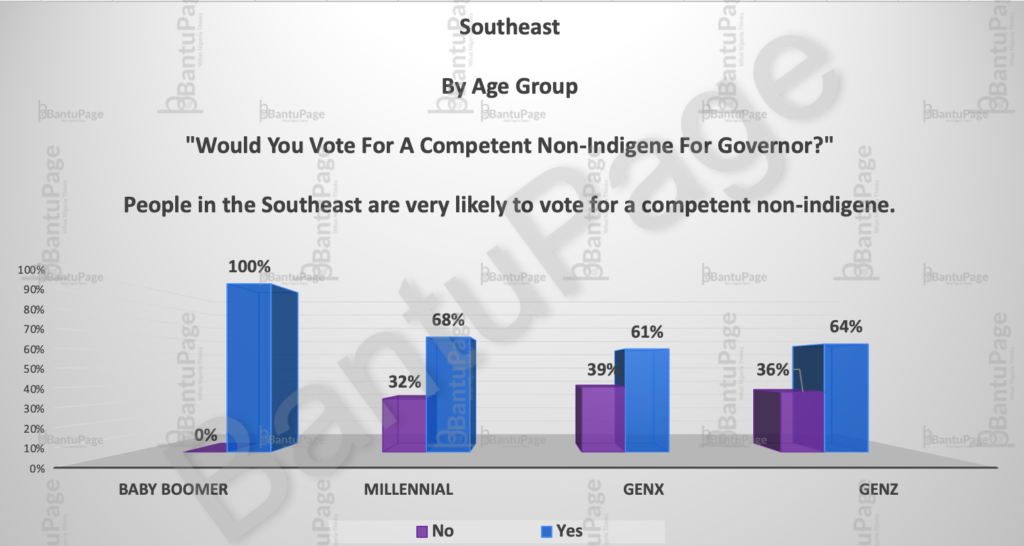
Southwest:

The Southwest yields the same general outcome as the Southeast; Nigeria’s most homogeneous geopolitical zones returned a correlated outcome; however, does correlation infer causation? Let’s look at the other layers that equally matter. The Yorubas, arguably Africa’s most urbanised ethnic group, have a long history that belongs to the echelon of Africa’s pride. The Lagos gubernatorial election spawned ethnic tension between the two largest ethnic groups in the South. Lagos, native to the Yorubas, became the capital city and later the economic capital of Nigeria. It plays host to Nigeria’s financial institutions, seaport, airport, and most of Nigeria’s key companies. As a result of this, Nigerians of all ethnicities flocked to Lagos as the seat of their nation’s hub. The Igbos, commercially savvy, entrepreneurially savvy, and nomadic by way of exploring commercial potential beyond their native land, have pierced into Lagos like no other. As with every multi-ethnic city, there are bound to be ethnic flares. I’m carefully avoiding the noun ‘clashes’ because, to a greater extent, despite the ethnic loggerheads in Nigeria, these twosomes have lived moderately peacefully.
In the Southwest, we will start with the Baby Boomer category. We saw how this category scored 100% in the Southeast, but the same was not the case in the Southwest. 65% said they would vote for a competent non-indigene, while 35% said no, 35% lower than the Southeast. As the saying goes, a decent society often puts its minority at the forefront. So, why can’t 35% vote for a competent non-indigene? One Nigeria as a dream shatters when you consider that reasonable Nigerians will not elect another Nigerian by default of ethnicity. Embarrassing!
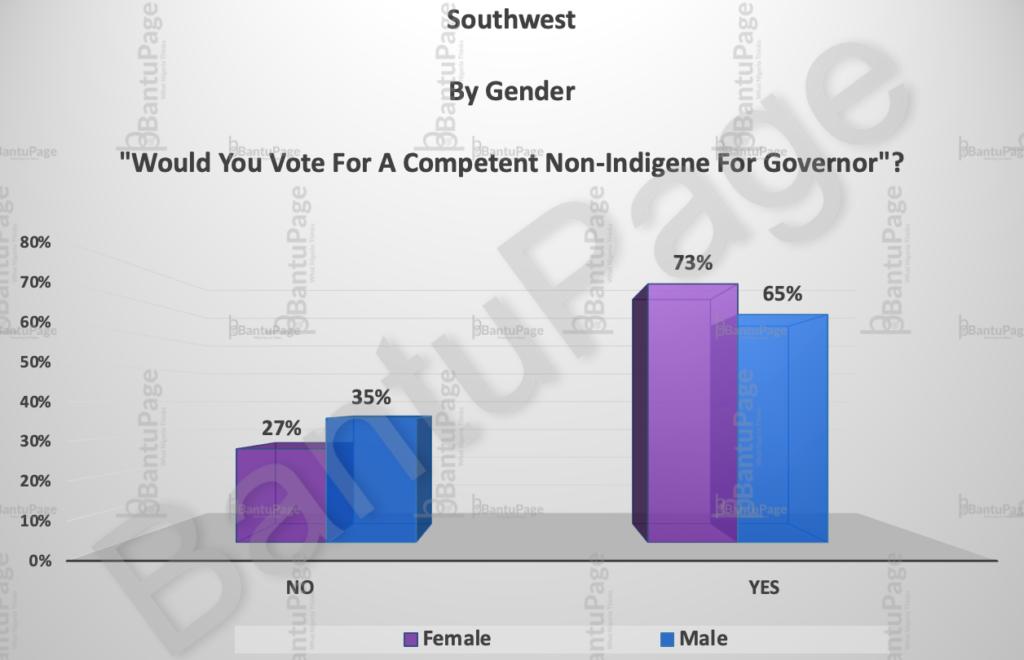
Our poll shows that Gen Z in the Southwest is even less ethnocentric than those in the Southeast. A staggering 81% of Gen Z in the Southwest are willing to vote for a competent non-indigene, 17% higher than the Southeast. Still, though, 19% said no. Overall, it is looking bright for Nigeria; younger people are increasingly becoming less ethnocentric, and that is a benefit we can draw from this.
In the Millennial category, the numbers were again high: 71% were very willing to vote for a competent non-indigene, 7% higher than in the Southeast. The 29% of Millennials in the Southwest who are not willing to vote for a competent non-indigene still present a worrying dilemma, but hope is not all dead; the higher number to the positive is a position to hold with pride.
The GenX category in the Southwest was 56%, 7% lower than in the Southeast, with a staggering 46% saying they will not vote for a competent non-indigene. The pattern between Nigeria’s most homogeneous geopolitical zones is not too far off; you can draw similarities but yet different onsets—to the positive, though.
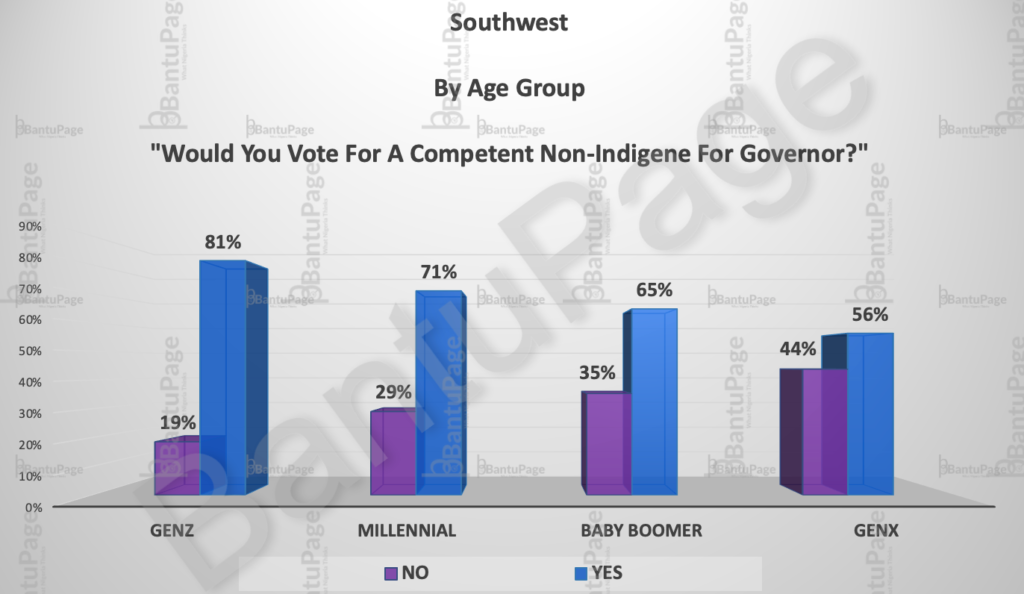
Conclusion:
Nigeria is far from being ethnocentric-free; we are aware of this. In order to speed up this detriment that has bedevilled our country for a century (pre- and Post-Independence), we need reorientation deep down in the foundation of our educational system. When the system of government is not representative or justice is not seen to be done in terms of appointment, allocation, distribution, infrastructure, and all the rest, ethnic resentment is bound to spawn. Nigeria is far from a fair country; it is not where it should be; poverty is on the rise; inflation has battered every corner of the country, pushing the country into the poverty capital of the world. With such a record, there is bound to be infighting.
Nigeria’s three largest ethnic groups can, by themselves, surpass all of the Scandinavian countries plus Belgium and/or Switzerland combined. These ethnic groups already consider themselves nations; it would seem they are too big to be controlled by a central government whose power stretches the bounds of these nations within Nigeria. Divulging power to reflect these nations ideals, values, and identities would seem like a starting point to begin building the bridge that may perhaps lead to the start of a new chapter for the betterment of the greater Nigeria. The office of the president of Nigeria is too powerful; it possesses powers commensurate with those of a dictator. A review is long overdue.
– Writer: – Ikechukwu Orji –

